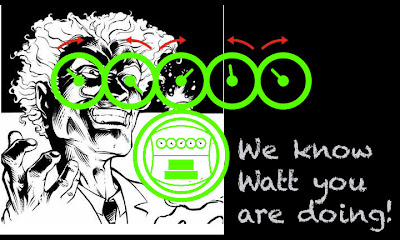Back in 2007, when the Dutch government announced that all 7 million homes in the Netherlands would be equipped with smart meters by 2013, it anticipated little resistance. After all, who wouldn’t welcome a device that could save both energy and money? But consumers worried that such intelligent monitoring devices, which transmit power-usage information to the utility as frequently as every 15 minutes, would make them vulnerable to thieves, annoying marketers, and police investigations. They spoke out so strongly against these ”espionage meters” that the government made them optional…

Of more than 9000 consumers polled in 17 countries, about one-third said they would be discouraged from using energy-management programs, such as smart metering, if it gave utilities greater access to data about their personal energy use…
It all sounds less paranoid when you consider that each appliance—the refrigerator, kettle, toaster, washing machine—has its own energy fingerprint, or ”appliance load signature,” that a smart meter can read. Anyone who gets hold of this data gets a glimpse of exactly what appliances you use and how often you use them. (more)
“300” writer Michael Gordon has sold a spooky surveillance project to NBC. The idea was spawned by the controversial U.S electronic eavesdropping apparatus ECHELON, a program that supposedly captures virtually all data signals for analysis at a central hub in West Virginia.
These millions of video, audio and data files are then disseminated to various federal and local law enforcement agencies for further investigation.
Now here’s the twist from the show’s logline: “There is, however, less than 1% of the data that nobody wants to touch. These are the classified video files that seem to have captured the unexplainable.”
The show will center on a fictional team called G.H.O.S.T. (Global Hierarchical Observation Strategy Taskforce) whose assignment it is to investigate this paranormal data. (more)
An Akamai Technologies Inc. employee was arrested and charged Wednesday with allegedly providing confidential business information over an 18-month period to a person he believed to be an agent of a foreign government.
Elliot Doxer, 42 years old, was charged in a complaint with one count of wire fraud, according to the Justice Department. The complaint alleges that on June 22, 2006, Mr. Doxer, of Brookline, Mass., sent an email to a foreign country’s consulate in Boston stating that he was willing to provide any information that he had access to that might help the country.
It is alleged that in later communications, Mr. Doxer said his chief desire “was to help our homeland and our war against our enemies.” He also allegedly asked for $3,000 in light of the risks he was taking.
The unnamed foreign government cooperated with the U.S. in the investigation. A Justice Department spokeswoman wasn’t immediately available to comment. (more)
Tasmania, Australia –
An overnight break-in in which burglars ransacked Aurora Energy’s Hobart head office has puzzled police and company chiefs.
Only the second-floor commercial section of Aurora was targeted by the thieves, who cracked a secret safe and stole a small sum of cash.
Computers were accessed and documents strewn across the office…
Police have not ruled out corporate espionage as a possible reason for the break-in, which occurred either late on Monday night or in the early hours of yesterday…
Professor John McFarlane, from the Australian National University’s Centre for Excellence in Policing and Security, said yesterday industrial espionage was not uncommon in the business world. “There have been very few prosecutions in Australia for this sort of activity, but that doesn’t mean it isn’t happening,” Prof McFarlane said. (
more)


